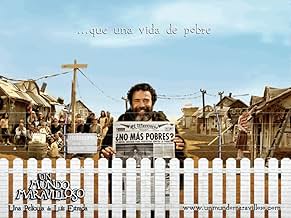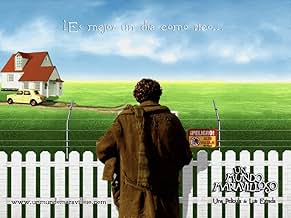IMDb-BEWERTUNG
6,8/10
1747
IHRE BEWERTUNG
Füge eine Handlung in deiner Sprache hinzuThe minister of Economy gives a house, a car and job to a man who tried to jump from a building because of his poverty; soon, every poor tries the same strategy.The minister of Economy gives a house, a car and job to a man who tried to jump from a building because of his poverty; soon, every poor tries the same strategy.The minister of Economy gives a house, a car and job to a man who tried to jump from a building because of his poverty; soon, every poor tries the same strategy.
- Regie
- Drehbuch
- Hauptbesetzung
- Auszeichnungen
- 11 Gewinne & 3 Nominierungen insgesamt
Pedro Armendáriz Jr.
- Director de 'El Mercurio'
- (as Pedro Armendáriz)
Empfohlene Bewertungen
No doubt about it, Estrada depicts some Mexico's political and social facts, however I find Herod's Law and A Wonderful World very similar.
I think Luis Estrada directs both movies following the same recipe.
Marginal class appear in both movies pretty good depicted; Mexican politicians as well; then come ridiculous circumstances that surround that lead both, politicians and poor people, beyond they ever dreamed: the politicians is rewarded for his criminal acts while the poor is dragged to his fate.
On Herod's Law the corrupt politician is rewarded becoming a Senator; on a Wonderful World the minister is awarded with Nobel Prize for starving the people. On the first movie the poor has to kill to get whatsoever he deserves (some respect and dignity) on the second movie this marginal family has to kill another family to get one single day of good life.
Herod's Law and A Wonderful World are pretty similar.
I think Luis Estrada directs both movies following the same recipe.
Marginal class appear in both movies pretty good depicted; Mexican politicians as well; then come ridiculous circumstances that surround that lead both, politicians and poor people, beyond they ever dreamed: the politicians is rewarded for his criminal acts while the poor is dragged to his fate.
On Herod's Law the corrupt politician is rewarded becoming a Senator; on a Wonderful World the minister is awarded with Nobel Prize for starving the people. On the first movie the poor has to kill to get whatsoever he deserves (some respect and dignity) on the second movie this marginal family has to kill another family to get one single day of good life.
Herod's Law and A Wonderful World are pretty similar.
Not the best movie I've seen... not even dark, acid enough. It is to be taken as a farcical look at Mexican social reality.
Some things aren't shown the way they really are in my country, such as the ideal family portrayed in it or even the house or neighborhood they live in.
But the way public officials deal with matters such as those they are confronted to in this movie is close enough. The way super-rich live also pretty close to reality, houses and all (and yes, there really are super-rich people in Mexico... one of them even ranks just below Bill Gates according to Fortune Magazine).
As for the poor... millions of people live like that in my country, way below any concept of dignity or any other ideas or social values we are fortunate to have been taught and live by. They are born and die in misery, without the faintest hope of ever getting out of poverty. To be sure, they are not that articulate or sympathetic, of course, so you need actors and a script to play their roles, and that way it is actually possible to be entertained for two hours by their coming and goings, which in real life are much too harsh and painful to be called tragedy.
But particular features of any given human existence taken out, the movie lets you catch a glimpse of what could be called the results of the World's economic and political organization.
And then, it could also be called tragedy.
Some things aren't shown the way they really are in my country, such as the ideal family portrayed in it or even the house or neighborhood they live in.
But the way public officials deal with matters such as those they are confronted to in this movie is close enough. The way super-rich live also pretty close to reality, houses and all (and yes, there really are super-rich people in Mexico... one of them even ranks just below Bill Gates according to Fortune Magazine).
As for the poor... millions of people live like that in my country, way below any concept of dignity or any other ideas or social values we are fortunate to have been taught and live by. They are born and die in misery, without the faintest hope of ever getting out of poverty. To be sure, they are not that articulate or sympathetic, of course, so you need actors and a script to play their roles, and that way it is actually possible to be entertained for two hours by their coming and goings, which in real life are much too harsh and painful to be called tragedy.
But particular features of any given human existence taken out, the movie lets you catch a glimpse of what could be called the results of the World's economic and political organization.
And then, it could also be called tragedy.
I had really liked director's Luis Estrada dark political satire La Ley de Herodes and I was looking forward to this one. But A Wonderful World disappoints. It is a political satire/fable, and the premise is interesting. In a not too distant future, the Mexican Minister of Economy declares there is no more poverty in Mexico and plans to run for the leadership of the World Bank. However, a homeless drunk gets in his way. On paper, the movie should work like a charm. It's a very dark satire of the Mexican elite's indifference to the poor. But the execution is very flawed, even if the film boasts a veritable roster of some of the best Mexican acting talent around. This is what really bugged me: The rhythm is glacial. The plot meanders. And every scene is way too long. Every scene could have been cut in half and it would have still expressed its point, but Estrada loves the sound of characters cursing colorfully yet endlessly. He and his co-screenwriter, and the editor haven't apparently gotten yet William Shakespeare's memo that brevity is the soul of wit, and so it is with this film -- long and increasingly witless. Satire requires precise, surgical timing, economy of words and feelings and a coldish heart. None of this is in evidence here. There is a virulent strain of sentimentality coursing through this film's veins that really is unbearable. It's so bad that in scenes where the bum cries you can actually hear they added sniffles in post-production. So cheesy! There is a ridiculous, rather offensive love story, between the bum, played with great panache, and quite some hambone by Damián Alcázar, and a poor woman called Rosita, played by the unfathomably ubiquitous Cecilia Suárez. Now why is this offensive? 1. Because Cecilia Suarez is not believable as an impoverished inhabitant of a slum. She is tall and pretty and white as snow and and her attempts at sounding low class are absurd. I wonder if there are no other Mexican actresses available that don't look like they were born with a silver spoon in their mouths. She seems like she's trying to channel a silent film actress and the comic character of La Chilindrina, and she is not only insufferable but silly. Why could a poor woman not be anything other than a blathering, innocent imbecile? It is a disgraceful performance and no friend of anybody who is poor. 2. Because the Mexican rich and or middle class (and this includes the filmmakers) still think that the poor speak and behave like comic characters out of a 1940's movie. This may have been the intention, but it backfires, because instead of portraying them with some modicum of dignity, they are just corny stereotypes. Good hearted and innocent, to boot. This is patronizing. And patronizing is what the Mexican elites are and have always been to the poor. This is actually one of the points of the movie so it is rather maddening that this awareness didn't seep through to the way the poor are portrayed. The bum has a collection of bum friends (all great Mexican actors: Jose Carlos Ruiz, the great Jesús Ochoa and the great Silverio Palacios) and they are cool, but the direction as usual is as broad and unsubtle as if they were playing to the rafters in Azteca Stadium. 3. There is a sequence in a hospital which is a completely unnecessary, cheap, pathetic dig at Mexican Jews (which by the way, are like less than 1% of the general population). It's supposed to be a very fancy private hospital, called Sinai, and it seems like all the patients wear yarmulkes just so you don't miss the point that Jews are the only people in Mexico who can afford fancy hospitals, which of course is not true. An attempt at wit is to see signs for the spa and the golf course and the pool in the hospital's lush grounds. My heart froze when I saw this. It is amazing to me that screenwriters Estrada and Sampietro would write something so objectionable, so stereotypical, so inane and so uncalled for. 4. I can imagine what they were trying to achieve with the production design, which oscillates between the shiny modern Mexico and the slums, which are given a sepia, Fellinesque treatment, but even this seems pretentious and half baked. In short, a good idea terribly executed. Lazy and mediocre, written with more stupidity than wit.
With regard to the comment entitled "Political propaganda by leftist artists" I'd like to point some things out. I saw this movie when it came out a few months ago in Mexico, where I had been studying all year. Like one of Estrada's first movies (La ley de Herodes), this one is also a severe political critique that attacks both the former PRI government (supposedly left wing) and the current PAN government (supposedly right wing). I think it should be noted, however, that while Fox's victory 6 years ago marked a BIG step towards political progress for Mexico, overall Mexicans are disappointed in the administration and the lack of significant changes that followed Fox's entrance into the office (not all entirely his fault, of course, given the left over PRI population that still has power in the government). And even though the PAN politicians might have cleaner hands than former PRI politicians, I don't think that the majority of the people in Mexico really distinguish between them that way. That is to say, I really think they just assume that all politicians, regardless of their party, are stealing money. Everyone I talked to while I was down there said they didn't have the slightest idea who they were going to vote for because all of the candidates were unappealing and untrustworthy, and it was all going to come down to the question, "Who's the lesser evil?"
So this leftist propaganda seems unlikely to me since López Obrador would be included in that category; even more so since he was originally a member of the PRI, and the PRD (his current party) is really just considered PRI #2, composed of unhappy PRI members who weren't being chosen for the positions they wanted. So, to sum all that up, the movie is critiquing Mexican politics in general and no party or politician is free from scrutiny here.
And finally, it's worth a rental if for no other reason than Damian Alcazar is absolutely wonderful!
So this leftist propaganda seems unlikely to me since López Obrador would be included in that category; even more so since he was originally a member of the PRI, and the PRD (his current party) is really just considered PRI #2, composed of unhappy PRI members who weren't being chosen for the positions they wanted. So, to sum all that up, the movie is critiquing Mexican politics in general and no party or politician is free from scrutiny here.
And finally, it's worth a rental if for no other reason than Damian Alcazar is absolutely wonderful!
Not bad, but you get a feeling of a missed opportunity. Essentially it is nowhere as good as La Dictadura Perfecta or La Ley de Herodes. The movie just drags on for too long while one of the key subjects, the Panglossian views of the. Minister are hardly explored. Towards the end of the movie we learn a bit by accident that 60 million Mexicans live in abject poverty. The Porfirio Diaz connexion is just mildly suggested, Had Luis Estrada shortened the tramp scenes and developed more the economic "Casi el Paraiso" (after Spota's comic novel), we would have had a stronger story. In any case it is entertaining, and definitely not two hours wasted!
Wusstest du schon
- WissenswertesCharacter Pedro Lazcurain is named after a Mexican president who lasted only one day in the job.
- PatzerThe portrait that appears in the house of the politician Lascuraian, the Secretary of Economy of México, is, in fact, the portrait of Porfirio Díaz, president of México (1877-1911), and not from José Ives Limantour, Secretary of Economy of México in Diaz administration
- SoundtracksWhat a Wonderful World
Written by George David Weiss and Bob Thiele
Performed by Louis Armstrong
Courtesy of Universal Music México
Top-Auswahl
Melde dich zum Bewerten an und greife auf die Watchlist für personalisierte Empfehlungen zu.
- How long is Un mundo maravilloso?Powered by Alexa
Details
- Erscheinungsdatum
- Herkunftsland
- Offizieller Standort
- Sprache
- Auch bekannt als
- Прекрасный мир
- Drehorte
- Metepec, Mexiko(location)
- Produktionsfirmen
- Weitere beteiligte Unternehmen bei IMDbPro anzeigen
- Laufzeit
- 1 Std. 58 Min.(118 min)
- Farbe
- Sound-Mix
- Seitenverhältnis
- 1.85 : 1
Zu dieser Seite beitragen
Bearbeitung vorschlagen oder fehlenden Inhalt hinzufügen



































